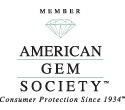November 6th, 2009 by James L. Sweaney, CGA, FGA. GG

Custom Platinum Filigree Ring with Alexandrite
With Filigree styles so popular, it’s really nice to see people choosing to create their own custom versions of these classic expressions of jewelry art.
Our client, call her Christie, had admired a very nice pear shaped natural alexandrite from our Gallery of Gems. This clean bright beauty has a good color change and pleasing shape that caught her eye and her imagination. Just what a gemstone should do!
Initially, she thought to have a ring made by Lucie Campbell, a jewelry designer from London. She had admired the the delicacy and flow of the intricate filigree work of this designer, but after thinking it over, she decided on having us make her a custom one-of-a-kind ring. Her exact quote was “I realized that I recognized some of Lucie Campbell’s designs as coming “from the same mould” and I really would like this ring to be a one-of-a-kind.”
Our approach in doing custom work is to listen very carefully to our clients. Their input is often the key to making the design really sing.
Read the rest of this entry »
Tags: CAD/CAM, Custom Design, filigree, hand engraving, JewelSmith, lost wax casting, natural alexandrite, platinum
Posted in Custom Jewelry, Gemstones, Jewelry Services | Comments Off on Custom Filigree Ring in Platinum with Natural Alexandrite
October 29th, 2009 by James L. Sweaney, CGA, FGA. GG
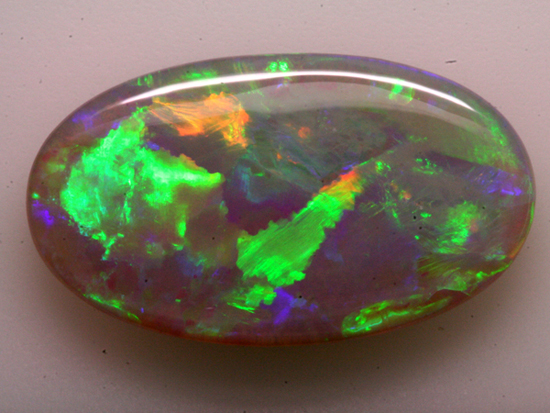
Flash Patterns in Lightning Ridge Opal, I-14753
What makes opal such a fascinating gemstone? When asked what opal looks like, most people would probably first think of the typical white base opal with little sprinkles and twinkles of color.
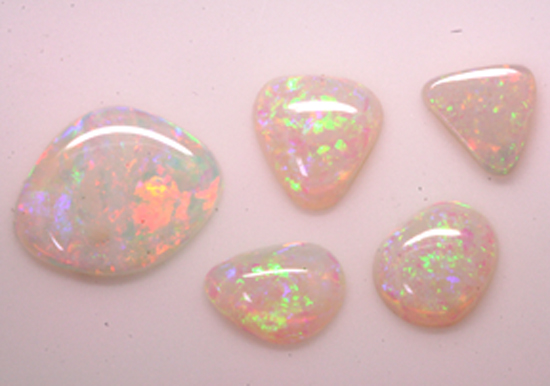
White Opal with Pinfire/Chaff Pattern Play of Color
This unique display of color is a phenomenon correctly known as play of color, not fire as it is sometimes referred to. Any opal with play of color is commonly called precious opal .
The truly amazing thing about precious opal is the rich variety of patterns and color groupings we see. Within the gem community, we classify these patterns with descriptive terms, the three basic groups of which are Pinfire, Flash, and Harlequin. Many precious opals display several patterns.
The most common pattern is called pinfire, also referred to as chaff, twinkle, and straw, often seen in white opal and in opal fossils, such as this opalized clam shell.
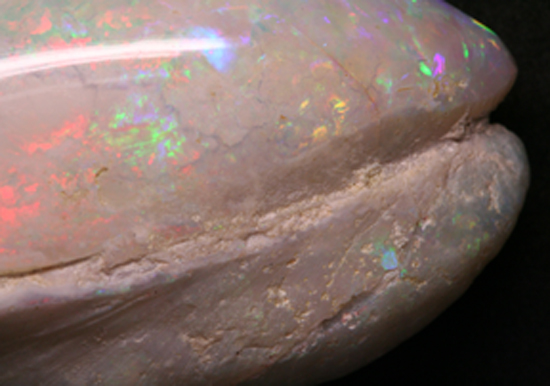
Pinfire in Opalized Clam Fossil
Other types of precious opal, such as black opal and boulder opal, display their play of color against a dark background. Since the appearance is much more dramatic, these types of opal are more sought after. Read the rest of this entry »
Tags: Australian opal, black opal, boulder opal, Brazilian opal, harlequin opal, Lightning Ridge opal, opal fossils, white opal
Posted in Custom Jewelry, Gemstone of the Month, Gemstones, Jewelry Facts, Jewelry Services | 1 Comment »
October 21st, 2009 by James L. Sweaney, CGA, FGA. GG
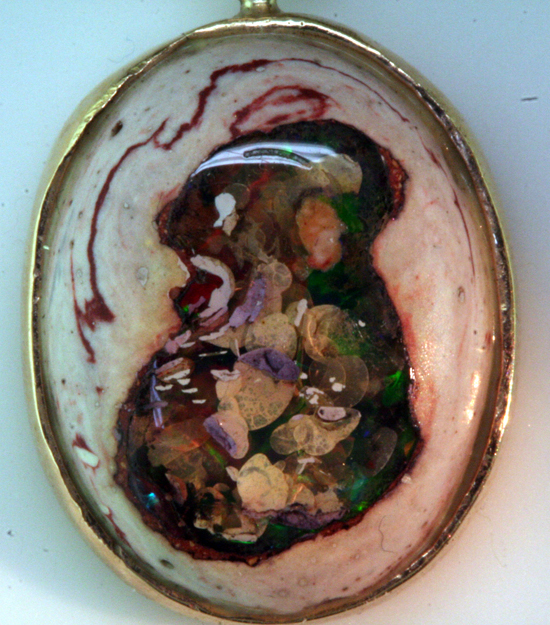
Madonna in Opal
A jeweler in Cabo San Lucas sold this Mexican matrix opal pendant to my client. He was very proud of the “Madonna” within the precious opal center. The white rhyolite matrix even has a “halo” or “glory” hovering over the figure!
I was very interested in the inclusions, never having seen “fish scales” in opal before. Or you could call them “fingerprint” inclusions, like what we often see in ruby and sapphire. I’ve sent a copy of the photo above to my friend John Koivula, gemologist jefe at GIA- we’ll let you know if he has anything to add.
The opal was tricky to photograph– the color flashes were elusive and difficult to capture– just the slightest variation changed the picture dramatically. Not the greatest opal in terms of play of color but certainly one of the most unusual and interesting stones we’ve seen in a while!
Tags: fingerprint inclusions, fish scale inclusions, John Koivula, Madonna, matrix opal, Mexican Opal
Posted in Gemstones | Comments Off on Madonna in Opal
October 17th, 2009 by James L. Sweaney, CGA, FGA. GG
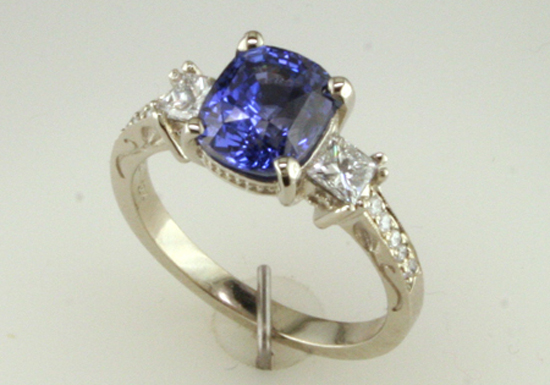
- Blog Photo #1
Last week, the thought occurred to me that it was time to do an anniversary blog– looking back thru the archive, turns out I had missed the anniversary by a month– our first blog was posted September 18, 2008!
We started the Mardon blog with the mission of consumer protection and education. The focus of our blog has been and will continue to be beauty and useful information.
We want our clients to know and appreciate fine gemstones and to understand what goes into creating beautiful jewelry. We try to alert them with useful information about pitfalls they may encounter as consumers, such as the recent gold buying scams that have sprung up like poison mushrooms. Read the rest of this entry »
Posted in Mardon Happenings | Comments Off on One Year of Blogs-Time Flies! Mission Statement
October 13th, 2009 by James L. Sweaney, CGA, FGA. GG
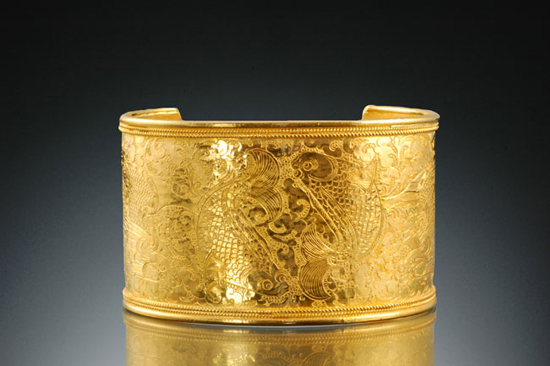
Pure Gold
The warm rich allure of gold has always attracted mankind, so much so that we seek it avidly and value it greatly. This precious metal is never thrown away, and always has value anywhere on planet Earth. Mardon Jewelers buys gold to recycle and uses recycled Harmony gold in all the products we make.
Recent record prices for gold have many people considering selling gold they own, so the question is how to get the best price. Before taking action, it’s always wise to research and educate yourself.
Before you recycle your gold, be aware of these facts about gold. Read the rest of this entry »
Tags: gold refiners, Harmony gold, karat gold, London Gold, recycled gold, spot price
Posted in Featured Post, Gem Industry News, Jewelry Facts, Jewelry Services | Comments Off on How to Get the Best Price for Your Gold.
October 10th, 2009 by James L. Sweaney, CGA, FGA. GG

Fabulous Opal Group
We recently had the privilege to work with this wonderful group of gem opals in the 7 to 10 carat category. The top row are opals from Mexico, including the orange red Fire Opal, and the others from Australia’s famous Lightning Ridge and Coober Pedy fields.
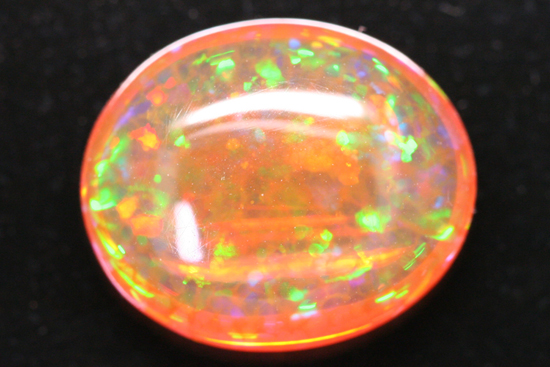
1. 6.70 ct. Mexican Fire Opal
The term Fire Opal refers specifically to those Mexican opals that have an golden orange to red body color. A Fire Opal may or may not have play of color– this one certainly does! Read the rest of this entry »
Tags: Coober Pedy, fire opal, harlequin, Jalisco, Lightning Ridge, Llovisnando, Lluvisnando, Magdalena, Queretaro
Posted in Custom Jewelry, Gemstones, Jewelry Facts | Comments Off on Fine Opals from Mexico and Australia- a Photo Gallery
October 2nd, 2009 by James L. Sweaney, CGA, FGA. GG
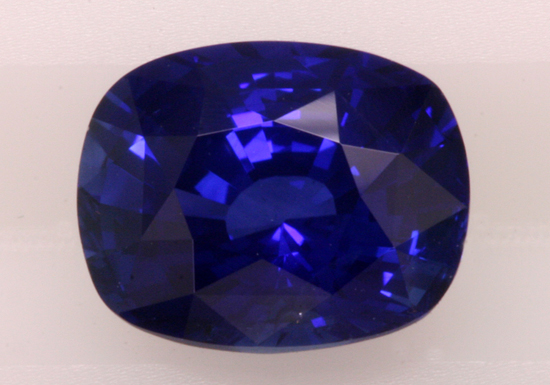
I-17700, 2.97 ct. Ceylon Sapphire
Blue, the color of sky, ocean, peace and tranquility has long been associated with purity and wisdom. Blue colors dominate many forms of spiritual art. Cardinals of the Catholic Church, exemplars of chastity and celestial purity, often wore rings of blue sapphire.
Blue has always been an important color for mankind, so when we ask what is the best color for blue sapphires, we should consider several points of view. Read the rest of this entry »
Tags: beryllium diffusion, Burma, Ceylon, gem enhancements, Geuda, glass filling, heat treatment, Kashmir, Madagascar, surface diffusion
Posted in Gemstones, Jewelry Facts | Comments Off on What is the Best Color for Blue Sapphire? Part 4
September 26th, 2009 by James L. Sweaney, CGA, FGA. GG
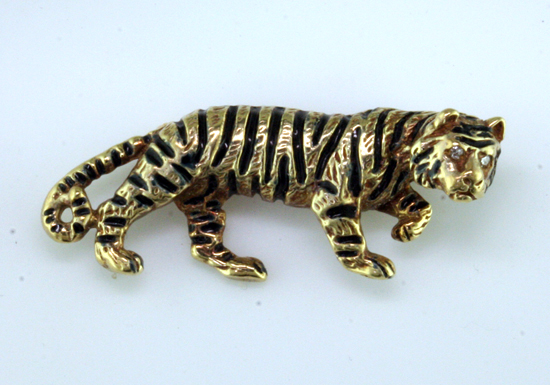
14K enameled gold pin, a la Cartier
Here are a few selections from a large and interesting collection of quality estate jewelry we purchased recently. Most of the items are modern period, many from Europe like this enameled tiger that evokes the pieces Cartier made famous during the 40’s and 50’s. 6.7 grams of 14k gold with diamond eyes, priced to sell at $195 Read the rest of this entry »
Tags: Bling, Cartier, enameled jewelry, Fabulous Fakes, garnet, jade, lapis, Pisani
Posted in Estate Jewelry, Jewelry Services | 2 Comments »
September 19th, 2009 by James L. Sweaney, CGA, FGA. GG

Vintage California Gold-in-Quartz Watch Chain, Side #1
This interesting and highly collectible “Prince Albert” style watch chain and fob is now on display in our Estate department. Though we have no direct provenance, because of the appearance and quality of the gem inlays and fob plus the fine craftsmanship, we’re pretty sure the piece is of California gold-in-quartz set in karat gold, manufactured in the last half of the 19th century. Read the rest of this entry »
Tags: gold-in-quartz, San Francisco, Sierra Nevada
Posted in Estate Jewelry, Gemstones, Jewelry Facts | Comments Off on Vintage California Gold-in-Quartz Watch Chain
September 16th, 2009 by James L. Sweaney, CGA, FGA. GG
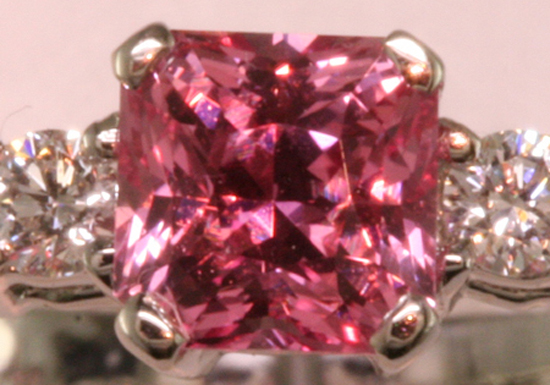
.86 ct Ceylon Padparadscha, Gem, no heat
We published this article February 2009 with good response. Since Sapphire is the stone for September, we thought it appropriate to republish, with minor additions, editing, new pricing information and larger pictures.
Early in my career as a gemologist, while working the gem identification counter at the GIA Gem Trade Laboratory in Santa Monica, I fell in love with Padparadscha—a gemstone, not a girl. The privilege of seeing and handling a few magnificent specimens of this magical sapphire with the glorious sunset orange and pink color was like cupid’s arrow to the heart.
Since that time, I always seek out the dealers at the gem shows who’ve “got the goods” and have had the pleasure to own and sell a number of fine Padparadscha Sapphires. We recently sold this small but extremely fine example, a .86 ct. octagonal loupe clean Sri Lankan stone, perfect color and beautifully cut, certificates from GRS and AGTA showing no evidence of heat treatment.
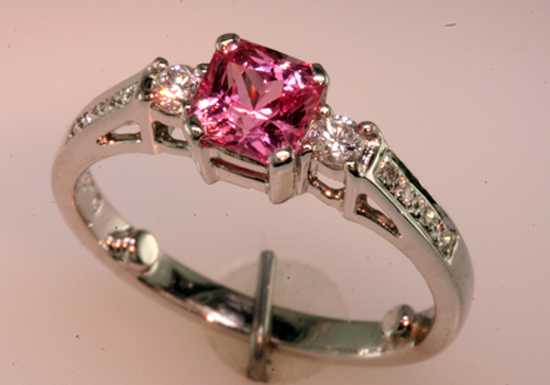
Read the rest of this entry »
Tags: beryllium diffusion, Ceylon, Chatham, GRS, Madagascar, Padparadscha, Robert Crowningshield, Sri Lanka, Tunduru
Posted in Custom Jewelry, Gemstone of the Month, Gemstones | Comments Off on What is the True Padparadscha? Again!




